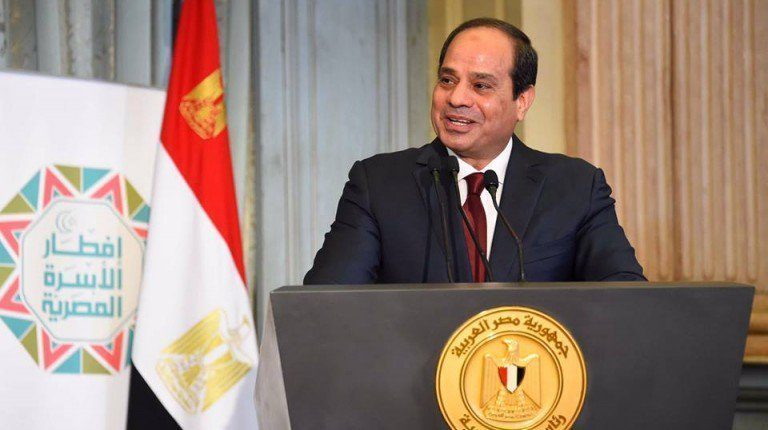
A pro regime TV anchor has called on Egyptians to eat donkey and horse meat, at the backdrop of the soaring food prices in the country.
Suggesting that Egyptians can eat donkey and horse meat, Egyptian TV anchor Tamer Amin has triggered new controversy on social networking sites as pro-government public figures attempt to downplay the surge in food prices.
The Egyptian pro-government talk show host has prompted angry reactions since his statement days ago that encouraged cash-strapped citizens to eat horse and donkey meats, which he claimed are “very healthy”.
“Why don’t we eat donkey and horse meats? They are sold and eaten in many countries,” Tamer Amin, the host of the Akher al-Nahar (Arabic for ‘late afternoon’) show on the local al-Nahar television channel, said on 8 March.
“Horse meat is very healthy and safe, and I believe it is not religiously forbidden,” he added, a day before Egypt’s statistics agency announced that urban consumer inflation has shot to a five-and-a-half-year high, reaching 31.9 percent.
The comments have been criticised by religious scholars, who emphasised that donkey and horse meats are “haram” or proscribed by Islamic law.
The prices of food and basic commodities, mostly imported, have more than doubled since the Egyptian pound was devalued at the beginning of this year.
This came after the International Monetary Fund approved a bailout with Cairo in December, the third deal since President Abdel Fattah el-Sisi came to power in a 2013 military coup.
The value of the Egyptian pound against the US dollar dropped from seven EGP in 2013 to just above 30 EGP at the time of publication.
A shift to a flexible exchange rate regime is among the main conditions of the international lender to reduce inflation and consolidate the country’s spiralling debts.
Prior to the deal and the devaluation, Egypt had already been reeling from the dual impacts of the Russia-Ukraine war and the Covid-19 pandemic on the import-dependent economy.
But the fiscal measures have had immediate effects on the majority of Egypt’s 104 million population, with an estimated 60 million people living below or just above the poverty line ($3.20 per day) before the current crisis.
The government last week also raised gasoline prices by around 10 percent to fulfil requirements of subsequent IMF deals to bring fuel prices in line with changes in global oil prices.
Amin’s remarks are reminiscent of a call earlier this year by the National Institute for Nutrition for people to switch to eating chicken feet, as a good and cheap source of protein instead of the rest of the chicken. The suggestion has since provoked backlash and ridicule, as chicken feet are not popular in Egyptian cuisine. They are usually thrown away or sold to factories that process chicken products.
Meat prices are reaching dramatic heights in Egypt, making it off limits for not only the poor, but also most members of the middle class. Egypt imports almost half of the 900,000 tonnes of meat it consumes every year.
The average price of meat rose in the local market from 180 Egyptian pounds (roughly $6) a kilo to 330 pounds (about $11) a kilo in a matter of a few months, as the Egyptian currency lost half its value since March last year.
Poultry prices have spiked as well, leaving poor and middle class Egyptians with limited animal protein options.
“I have stopped buying meat a long time ago because of these high prices,” schoolteacher Rahma Saeed, who is a mother of three children, said, according to MEE.
“Has it come to this?” Mamdouh Mohamed, a tailor in his mid-fifties, asked.
“I can never eat donkey or horse meat,” he said.
Nevertheless, many consumers may have already eaten donkey meat without even knowing it, at meat stalls which are ubiquitous on Cairo’s streets and other Egyptian cities.
The stalls which sell cooked offal and animal meat cuts such as tongues, tripe and tails are very popular among Egyptians.
However, the purported owner of a chain of restaurants that serves cooked organ meat shocked the nation a few days ago when he claimed that most offal stalls serve donkey meats to their customers.
The owners of these stalls, the man said, cannot afford the price of organ meats from livestock.
Egypt’s Sisi has previously attacked the media, most of it controlled by the state, for their coverage of the latest crisis around the cost of food in the country.
“Why do you portray Egyptians as if they are in a state of panic over food and drink? This is not appropriate,” he said on 23 January. “I am not saying this is not true, but eating and drinking is not the end of the world,” Sisi said.
Some of the nation’s restaurants reportedly serve donkey meat, instead of livestock meat, due to high prices.
This also comes amid a spike in reports about the random slaughter of donkeys in different parts of Egypt.
This has forced food specialists to take to the airwaves to explain to the public the difference between donkey meat and livestock meat.
Some people also say that donkeys, which are usually used in Egypt for transport, are slaughtered for their skin, which is exported to China.
“The rise in the prices has even become burdensome for financially-capable people,” Alaa Ahmed, a salesman in his early forties, said.
“The government has little control over the market, giving traders the chance to exaggerate prices the way they want.”
“The rise in food prices in the international market has placed unprecedented pressures on foreign currency reserves in the country,” MEE reported citing Hesham al-Dugwi, the head of the food section at the Giza Chamber of Commerce.
“It is also widening the food gap, for the first time in years.”



